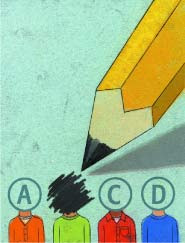
The last two readings Claire Lutkewitte, Web 2.0 Technologies in First-Year Writing and Elaine Childs, Using Facebook as a Teaching Tool provided all of the links that a teacher of composition may need for teaching writing with technology. The Lutkewitte article brings every link right to your fingertips. Childs on the other hand explains how she used Facebook in her writing class, and how the students and her benefited from writing to one another through this site.
My mind this week is somewhere else. The Superintendent of the district for which I work, decided this week to "reconstitute" the school I work for, citing poor test scores and no "sense of urgency" for improvement. This means that every staff member, administrator, janitor and cafeteria worker that wants to work here in the next school year will have to re- apply. The official article is here http://www.latimes.com/news/local/la-me-lausd-fremont11-2009dec11,0,2111040.story
The mood on campus is bleak. Everyone of my co-workers seems demoralized, upset, hurt and angry. A couple of things were particularly upsetting to me. First of all our school was not the high school with the lowest test scores, there are four other high schools in the district with lower test scores. Secondly, these "poor test scores" are a measure derived from ONE test, the California Standards Test, which measures student performance all over California. This means that the scores from students in more affluent communities with more resources in their communities are placed side by side with the scores of our students. This school is located in South Central Los Angeles, territory for five major gangs, high level of poverty, crime, drugs and violence. Well, of course students from Arcadia, or Monterrey Bay will score higher in this test, they don't go to school with hunger in their stomachs or the worry of how mom and dad will pay for electricity in their minds. It is not fair to make such comparisons, not even with other schools in the same district. The school is over populated with over 4,000 students, and understaffed many classrooms with long term subs.
I was also bothered that the Superintendent made this horrible announcement on the day that Secretary of Education Arne Duncan was in town. Duncan is a supporter for the privatization of education and drastic school reform. It was all a show for the Superintendent, he wanted to be on the headlines, a hero for reforming such a "bad school". All of this occured while the entire staff had been working for months and trying to unite with the Los Angeles Educational Partnership and work towards improving our school. We were lead to believe that we could work with this organization to create a partnership for the improvement of our school. It was all a lie however, this despicable man had something up his sleeve. He made this decision before consulting with the parents or community. My students and their parents have yet to receive a letter informing them of this important decision.
The announcement was revealed to us teachers at an "emergency meeting" on Wednesday, this because the Los Angeles Times would publish a blog about this that same day, according to the Superintendent he wanted us to hear it from him. So we were all pretty shocked to hear what he had to say, during this announcement he also said that students would be required to wear uniforms. How this will improve test scores, I am still trying to find out. What I do know for sure is that many of the students are already struggling financially, uniforms will only be another hardship and burden on the parents and students. Did I mention that this is the same Superintendent that is giving away over 50 schools to charters and private operators? He is desperately working to privatize education, for his own political agendas. After his announcement at my school he, ran, not walked out of the auditorium, the man RAN, along with some security personnel that were there "protecting" him. I'm not sure how pricey these were but perhaps he should have saved this money to pay for some uniforms to give to the students.
And what about the mismanagement of resources within the district and our school? The revolving door of 7 principals and many administrators. The "instructional guides" and "periodic assessments" that are mandated by the district. We have had our share of incompetent principals and assistant principals, criminals to say the least.
At our school we have done all we were told, but now we are to blame. Well except for reading, at some point an administrator at my school told me that Silent Reading was a waste of time for students. I'm not supposed to do it, however my conscious will not allow be to deny my students of the opportunity to read everyday!
In order to be a teacher we have undergone years and years of school, teacher credentialing programs, and endless professional development and training. Many of my colleagues have master degrees and many years of experience in the classroom. It is not like we haven't worked hard to be in our classrooms. Working in the inner city is difficult. It would like to see the Superintendent teach my classes, 5 ninth grade classes for one day! Maybe I can learn from him, maybe he can teach me how to be a great educator. This would be a great idea I think, except I suspect that the Superintendent has not taught a class in years!
Lastly I was upset by his remarks that "poverty" or a "single parent household" was not an excuse for "poor test scores". Well excuse me, but I don't think he has ever lived around this neighborhood. I have. I know what it is like to walk to school and see a boy or girl being attacked by gang members for wearing the wrong color. I was at the school when someone ran inside with a gun and the whole school had to be locked down. My best friends brother was shot and as a result in on a wheelchair for life. My friend's mother had breast cancer and was unable to pay for proper treatment. My parents have been unemployed numerous times. Currently many of my students suffer the same faith. Many parents have lost their jobs. Many students do not eat breakfast at home, not because they don't want to, but because there is nothing to eat. Many of my students come to high school not knowing how to read or multiply. Just last week I my heart sank when I saw three students sharing ONE pop tart. I would say that a large number if not everyone in the community lives below the poverty line. So until I see the Superintendent live in this community, teach in this community for an extended period of time, he has no right to say that "poverty" is not an excuse for the poor scores on a test that unfairly measures their learning with the learning of students at Beverly Hills High school. Poverty and socioeconomic factors have a lot more to do than he is willing to accept. But we all know that for him the students at this school are nothing more than just a number. The Superintendent does not care about the students at our school, or any other for that matter, he can go home every night to his big house, in his lavish community, unfortunately my students go home every night to the complete opposite. My students and all of the students at this high school are braver, smarter, more courageous than he can ever hope to be.












